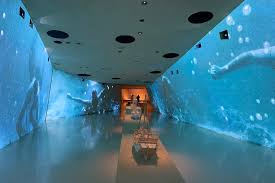National Museum of Qatar, Qatar
🏛️ National Museum of Qatar: A Nation’s Story in Stone and Light
In the heart of Doha, where the desert meets the Gulf, stands one of the most stunning museums in the world—the National Museum of Qatar (NMoQ). Designed by renowned architect Jean Nouvel, the museum resembles a desert rose—a crystalline formation found in Qatar’s arid lands. But it’s not just about looks; the museum tells the extraordinary story of Qatar’s past, present, and future through immersive galleries, artifacts, and state-of-the-art technology.
🪨 Architecture Inspired by Nature: The Desert Rose
The first thing visitors notice is the architectural spectacle of the building itself. A marvel of contemporary design, Jean Nouvel’s vision for the museum mimics the geometric petals of a desert rose, blending nature with futuristic engineering.
✨ Architectural Features:
-
Interlocking disks give the illusion of layered petals
-
430,000 square feet of space combining galleries, auditoriums, and public areas
-
Glass bridges, curved walls, and natural lighting make the space feel alive
This structure alone is worth the visit and is considered one of Doha’s most Instagrammable locations.
📜 Thematic Galleries: Qatar’s Timeline in Motion
The museum’s interior is a journey through time. Visitors follow a chronological path through 11 immersive galleries that unfold the story of Qatar—from prehistoric times to the era of oil and into the nation’s modern-day global aspirations.
🗺️ Highlights Include:
-
Geological history of the Arabian Peninsula
-
Pearling industry and Bedouin heritage
-
Colonial encounters, treaties, and national independence
-
Oil discovery and the rise of modern Qatar
-
A final gallery on contemporary life and future vision
Galleries are filled with interactive displays, videos, soundscapes, and sensory environments that pull visitors into Qatar’s cultural evolution.
🖼️ Artifacts & Exhibits: Treasures of Identity
The museum’s collection consists of more than 8,000 objects, each telling a specific story. Unlike traditional display-focused museums, NMoQ is all about narrative and experience.
🎯 Must-See Pieces:
-
A complete 19th-century palace of Sheikh Abdullah bin Jassim Al Thani
-
Pearling boats, tools, and trade records
-
Traditional Bedouin jewelry, textiles, and weapons
-
3D immersive films recreating historic souqs, family life, and maritime scenes
These displays don't just show; they immerse you in the heartbeat of Qatari life—from tribal alliances to FIFA 2022 ambitions.
🎥 Technology-Driven Storytelling: Art Meets Innovation
One of the museum’s strongest features is its blend of art and technology. Multimedia screens wrap entire rooms, surround-sound narrations follow your steps, and interactive stations bring Qatar’s past alive with just a touch.
-
360° video projections simulate desert storms and trading ports
-
Holographic narrators retell legends and oral histories
-
Children’s stations feature games, puzzles, and animations based on real events
Whether you're 8 or 80, the museum keeps you engaged, educated, and emotionally connected.
🌴 Heritage Meets Leisure: Outdoor Spaces & Family Fun
Beyond the galleries, the museum grounds offer an oasis of relaxation and learning. The heritage village features restored architecture from old Doha, while a shaded lagoon and park invite families to unwind after the cultural experience.
-
Playgrounds, picnic areas, and cafés surround the museum
-
Cultural events, concerts, and open-air exhibitions are regularly held
-
The museum’s Lagoon Café and Jiwan restaurant offer meals with skyline views
A visit to NMoQ isn’t just a museum trip—it’s a full-day cultural escape.
🧭 Visitor Info: Planning Your Visit
-
📍 Location: Museum Park St., Doha, Qatar
-
⏰ Hours:
-
Saturday to Thursday: 9:00 AM – 7:00 PM
-
Friday: 1:30 PM – 7:00 PM
-
-
🎟️ Entry:
-
Free for Qatari nationals and residents
-
QAR 50 for tourists (discounts for students, children, and groups)
-
-
🌐 Audio guides and mobile apps available in multiple languages
💡 Tips for Visitors
-
Book tickets online during high seasons to avoid queues
-
Allocate at least 2–3 hours for the full experience
-
Wear comfortable shoes—you’ll walk through 11 galleries
-
Visit just before sunset for beautiful exterior photos
-
Combine your visit with nearby attractions like MIA or Souq Waqif
🌟 Why You Shouldn’t Miss the National Museum of Qatar
This museum redefines what it means to experience culture. It doesn’t just display—it invites you into a story that blends history, art, technology, and emotion. Whether you're a seasoned museum-goer or just seeking an unforgettable destination, NMoQ stands out as one of the most unique and powerful cultural institutions in the Middle East.


